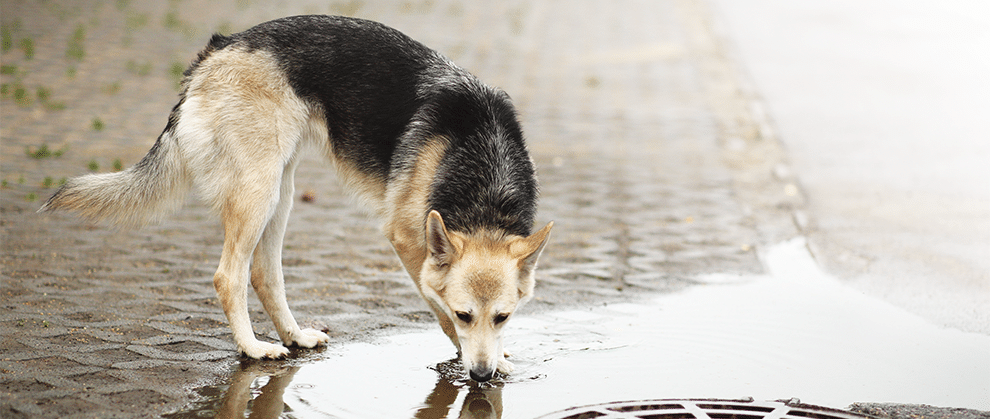Leptospirosis is a disease caused by infection with Leptospira bacteria. These bacteria can be found worldwide in soil and water. There are many strains of Leptospira bacteria that can cause disease, and many mammals are vulnerable—including dogs, people, livestock, and certain wildlife. Although cats also may become ill, this happens only rarely.
Leptospirosis is more common in warm climates with high annual rainfall, but it can occur anywhere, especially after heavy rainfall and flooding. For dogs, the midwestern, eastern, and southwestern regions of the United States are considered hotspots of infection.
In some parts of the United States, where Leptospira bacteria are widespread in the environment, almost every dog is at risk of catching leptospirosis, regardless of whether they live in the country, suburbs, or city. Dogs of any age, breed, or sex can be affected. The following situations can put dogs at higher risk:
- Exposure to or drinking from slow-moving or stagnant water sources, like ponds, rivers, lakes, or streams
- Roaming on rural properties (because of exposure to potentially infected wildlife or farm animals or urine-contaminated water sources)
- Exposure to wild animals (especially rodents) or farm animals, even if in the backyard
- Contact with other dogs (such as in urban areas, dog parks, or boarding or training facilities)
What are the signs of leptospirosis in dogs?
The signs of leptospirosis in dogs vary, depending on the strain of the infecting bacteria, the dog’s immune response, and other factors. Some infected dogs have no signs of illness; some have a mild and transient illness and recover on their own; and others develop severe, life-threatening illness.
For dogs that do become ill, the signs tend to be non-specific. These are the most common signs:
- Loss of appetite
- Vomiting
- Lethargy
- Abdominal pain
- Diarrhea
- Jaundice (yellowing of the skin and mucous membranes)
- Dehydration
- Drinking or urinating more than usual
- Weight loss
- Stiffness or muscle pain
The disease can progress to kidney and/or liver failure. Some dogs may develop severe lung disease and rapid, difficulty breathing. Damage to the heart muscle has been suspected in some cases.
Leptospirosis also can cause bleeding disorders, which can lead to blood-tinged vomit, urine, feces (stool), or saliva; nosebleeds; and pinpoint red spots on the gums or other mucous membranes, or on light-colored skin. Fluid can build up in the body, causing swollen legs or excess fluid in the chest or abdomen.
Leptospirosis may be suspected based on the exposure history and signs shown by the dog, but many of these signs can also be seen with other diseases. In addition to a physical examination, your veterinarian may recommend a number of other tests such as blood tests, urine tests, radiographs (x-rays), and an ultrasound examination.
How is leptospirosis spread?
Leptospirosis is most often spread through the urine of an infected animal, especially (but not only) wild rodents. Infected dogs can seem healthy but still pass Leptospira bacteria in their urine. The bacteria can survive for weeks to months in urine-soaked soil.
Dogs typically become infected when their mucous membranes (as in the mouth, nose, or eyes) or skin wounds (like cuts or scrapes) are exposed to urine or urine-contaminated water or soil. Infection can also be spread through urine-contaminated food or bedding, or the tissues or carcasses of infected animals. There also are rare instances when exposure to Leptospira bacteria occurs through breeding with or being bitten by infected animals. An infected mother dog may pass the bacteria to her unborn puppies through the placenta.
How is leptospirosis diagnosed and treated in dogs?
Because leptospirosis can look like other diseases, your veterinarian will need your help to make a diagnosis. This includes sharing information about your dog’s lifestyle and travel history, which can help highlight possible exposure to Leptospira bacteria. In addition to a complete physical exam, your veterinarian may recommend certain blood tests, urine tests, X-rays, and an ultrasound exam. The choice of recommended tests is usually based on the nature and severity of the illness.
Leptospirosis is generally treated with antibiotics and supportive care. Depending on how sick an affected dog is, they may require fluid therapy, certain medications, and nutritional support. Dogs with severe disease may need intensive care measures such as oxygen therapy, mechanical breathing support, or dialysis.
When leptospirosis is treated early, the chance of recovery is good. However, there is still a risk of permanent residual kidney or liver damage. For dogs whose kidneys are struggling to pass urine despite supportive treatment, a referral for dialysis may provide support until the kidneys recover function, and can be lifesaving. Dogs with severe respiratory disease are less likely to recover, even with treatment.
How can I protect my dog against leptospirosis?
Fortunately, vaccines are available to protect dogs from this potentially life-threatening disease. An initial series of two vaccinations is typically recommended, followed by annual boosters. Your veterinarian can help you decide whether and when vaccination might be right for your dog, based on your and your dog’s needs. Contrary to some beliefs, these vaccines are no more likely to cause side effects than are other common vaccines.
Reducing your dog’s exposure to possible sources of Leptospira bacteria can reduce the chance of infection:
- Avoid letting your dog drink from or swim in rivers, lakes, ponds, marshy areas, or slow-moving or stagnant water.
- Keep your dog away from farm animals and wild rodents, including carcasses.
Although an infected dog is unlikely to infect you and your family, there still is some risk. Infected dogs also may infect other pets in the home. The following precautions can help protect you all:
- Give antibiotics to your infected dog as prescribed by your veterinarian.
- Wash your hands after handling the dog.
- Avoid contact with urine.
- Quickly clean up any urine in the home with a household disinfectant, and wear gloves while doing so.
- Encourage your dog to urinate away from standing water or areas where people or other animals will have access.
If you are ill or if you have questions about leptospirosis in people, consult your physician. If you are pregnant or immunocompromised, consult your physician for advice.


